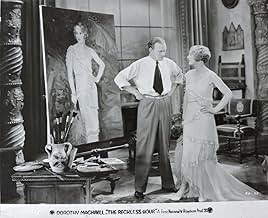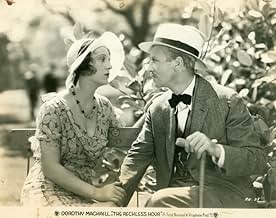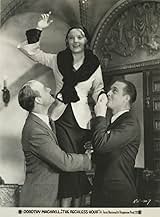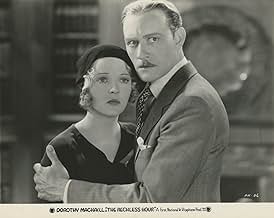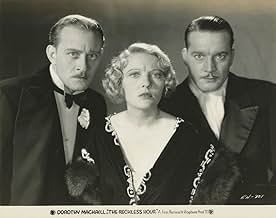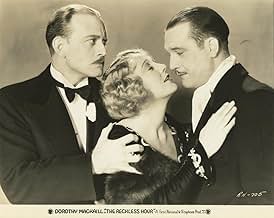Ajouter une intrigue dans votre langueIn New York City, a young model is swept off her feet by a debonair, handsome young man. Unfortunately for her, he didn't want to get married but had been stringing her along. When she reali... Tout lireIn New York City, a young model is swept off her feet by a debonair, handsome young man. Unfortunately for her, he didn't want to get married but had been stringing her along. When she realizes he doesn't want her, she will not force him even though she learned she was pregnant. ... Tout lireIn New York City, a young model is swept off her feet by a debonair, handsome young man. Unfortunately for her, he didn't want to get married but had been stringing her along. When she realizes he doesn't want her, she will not force him even though she learned she was pregnant. She becomes bitter and angry at all men, until she meets a gentle and kind artist who trie... Tout lire
- Réalisation
- Scénario
- Casting principal
- Seymour Jennison
- (as William House)
- Hal - Allen's Friend
- (non crédité)
- Crane's Butler
- (non crédité)
- Rita
- (non crédité)
- Stevens - Adams' Butler
- (non crédité)
Avis à la une
Meanwhile her younger sister(Joan Blondell) is dating the guy Maggie jilted. Her father (H.B. Warner) is having a tough time with his book shop, and her mother (Helen Ware) defends Maggie's dating the rich guy. Things start to go wrong, however, when Maggie discovers she is pregnant. She assumes the rich guy will marry her. After he dumps her, she's left to explain things to her father.
After some time in a "rest home," she meets another rich guy (Conrad Nagel). Has she learned her lesson? Will he be interested in "damaged goods"? Should she tell him everything?
Mackaill is terrific as Maggie and earns audience sympathy by being so nice. She's matched here by the snappy Joan Blondell who drops wise cracks every time she opens her mouth. Warner and Ware are fine as the parents. Byron is an appropriate louse. Nagel is fine as the nice guy. Also in the cast are Billy House as Jennison, Dorothy Peterson as his wife, and Joe Donahue as the sourpuss Hal.
As a pre-Code film, there are some surprises in the way the women act. A few years later, the Code would force certain behaviors and conclusions. There's one outrageous exchange when Maggie declines to go out with her drippy boyfriend. When Blondell's character jumps on her for standing him up, the mother says something like, "Leave Maggie alone. She's been on feet all day." Blondell (whose character works at Macy's) snaps back, "And where have I been all day? On my back?"
"The Reckless Hour" concerns a young model, Margaret (Dorothy Mackaill) who falls for a playboy Allen Crane (Walter Byron). Her family isn't wealthy - Margaret lives with her parents Walter and Harriett (H.B. Warner and Helen Ware). Her mother, of course, is thrilled that she's dating someone from a wealthy family.
Walter isn't. He notices she's wearing a very expensive bracelet and informs her that if she's seen wearing it, people will realize it's too expensive for him to have given her. Then what will people say? Back then, a man giving jewelry was just not done unless the two are engaged or married. Margaret says it's a fake, and besides, it's an engagement gift, to Walter's relief.
Well, the bracelet is real, as a friend informs Walter, and it really isn't an engagement gift. Margaret and Allen are fooling around in an apartment he keeps in the city. One night while on the town, they meet a friend of Allen's, Eddie (Conrad Nagel). He is immediately attracted to Margaret, and then realizes that she's sleeping with Allen.
Upset that Allen may be taking his daughter for a ride, he confronts Allen's father, who never heard of her. A confrontation between Allen, his own father, and Walter - overheard by Margaret - solidifies the fact that Allen has no intention of marrying her. Allen's father insists that if he said he would, he's going to. Margaret says no. Later she tells Walter that she's pregnant - by saying "I didn't tell him...everything."
Walter raises the money to send her to a rest home. When she returns, she learns that Eddie, who is an artist, having learned she's no longer with Allen, has been asking for her. She decides to work for him.
Really lovely film, based on a play, dealing with a common pre- Depression theme then - class differences - which ended with the Depression when writers like Clifford Odets began to write plays about the working man. And, before the code, women who slept with men before marriage weren't killed in the last reel as punishment.
Dorothy Mackaill was beautiful and gives a touching performance; Joan Blondell as her wisecracking sister is a riot. For me the best performance was by H.B. Warner. Warner is most famous for being Jesus in the DeMille King of Kings, and more famous for being Mr. Gower, the pharmacist in It's a Wonderful Life. His performance is heart- wrenching and his love for Margaret is palpable. In this film he's in his fifties but today could pass for 80. Amazing.
Excellent film - check it out.
Yet, Hollywood still produced some dramatic films. A common element of those included the wealthy, high society, and the fun life. Audiences could still dream about the good life – a life that most would never really achieve or see. And, mostly those serious films about the rich and worldly had a tragic element to them. The message was that all was not sunshine and gaiety at the top.
"The Reckless Hour" has the usual appeal to riches. The film seems to be set in a time when there wasn't a depression. I would guess that models and jewelry clerks would have been among the least employed during that time. Yet, here we have Dorothy Mackaill and Joan Blondell in just such jobs. Mackaill's Margaret Nichols is the model, while Blondell plays her sister, Myrtle. It's through Margaret's job that this film acquires its riches theme.
I won't divulge the story more here, but just note that this is a surprisingly good morality play. It bursts the bubble of the idea that wealth is everything and brings happiness. The title hints at what is to come. It's a story about hope, decency, mistakes, forgiveness, family, selfishness and charity, kindness and sacrifice. In its own way, this film could lift the spirits of audiences.
The attention given this film for being "pre-code" seems nothing more than a marketing effort today. While there is a situation that could be very scandalous in that day and time, it is only alluded to in the film. And, it's important to the plot, and as an example of the culture and mores of the time.
All of the cast give good performances. Mackaill was a dramatic actress who starred in many silent films of the 1920s. She made the transition to sound with several good films in the early 1930s. But, the rise of many new talented and attractive stars diminished her demand and she retired from films by the mid-1930s. Blondell, on the other hand, was more diversified, and her movie career would last until her death at age 73 in 1979. She played in many comedies, but was also very good in dramas, musicals and other genres. Walter Byron's career also started in the silent era and came to an early end by the start of the 1940s.
This is a good film for a look at these and some other good actors who graced many films into the mid-20th century, but who today are little known. Conrad Nagel, H.B. Warner and Claude King had very good careers in movies.
Le saviez-vous
- AnecdotesThe play, "Ambush," opened on Broadway in New York City, New York, USA on 10 October 1921 and had 90 performances. The opening night cast included Florence Eldridge as Margaret and Frank Reicher as Walter.
- GaffesWhen Margaret takes the 1789 Robert Burns edition from her father and sets it on a shelf, she crosses under the microphone boom and it casts a shadow on her.
- Citations
Edward Adams: Alan, old boy!
Allan Crane: Ed Adams! Of all people - what are you doing in this country? I thought you were in Paris!
Edward Adams: I came back to do a series of covers for *Pose*.
Allan Crane: Good work. Is the wife with you?
Edward Adams: No, she's in China.
Allan Crane: By herself?
Edward Adams: Not exactly. Evelyn Grant's husband is with her.
Allan Crane: Honestly?
Edward Adams: I wouldn't call it honestly, but he's with her.
Allan Crane: Oh, I'm sorry, Ed; really I am. What on earth can she see in that half-portion?
Edward Adams: Full-portion bank account, I guess.
- Bandes originalesNevertheless (I'm in Love with You)
(1931) (uncredited)
Music and Lyrics by Bert Kalmar and Harry Ruby
Played as dance music by the band at the Casino
Meilleurs choix
Détails
- Date de sortie
- Pays d’origine
- Langue
- Aussi connu sous le nom de
- Pigen fra Broadway
- Lieux de tournage
- Société de production
- Voir plus de crédits d'entreprise sur IMDbPro
- Durée1 heure 11 minutes
- Couleur

